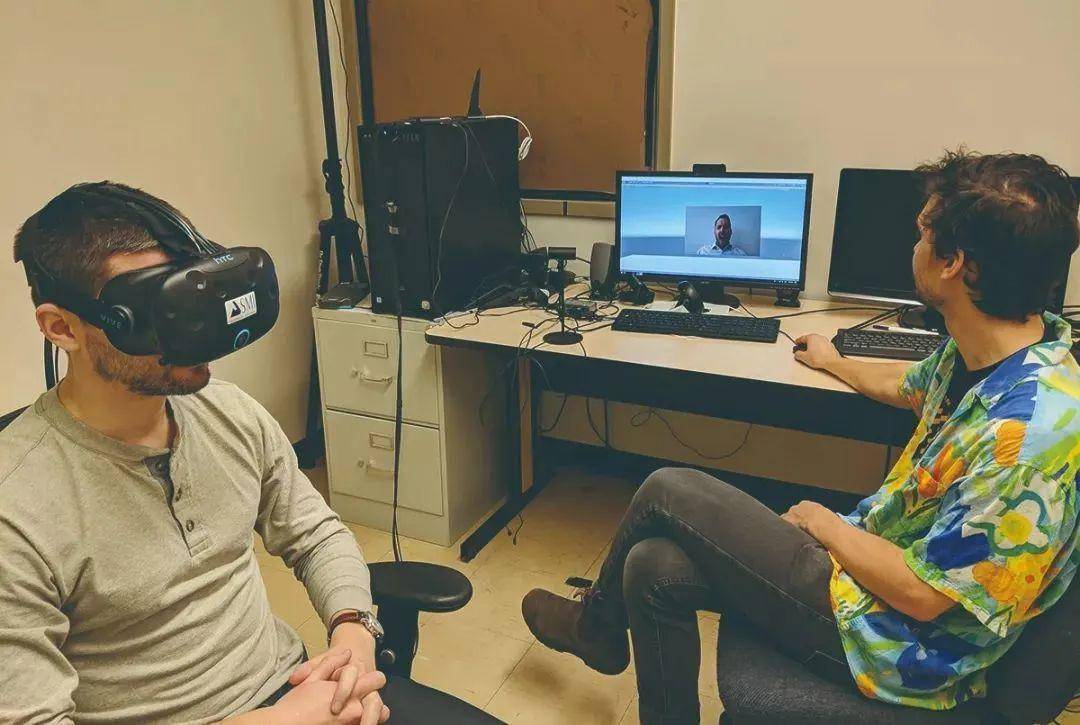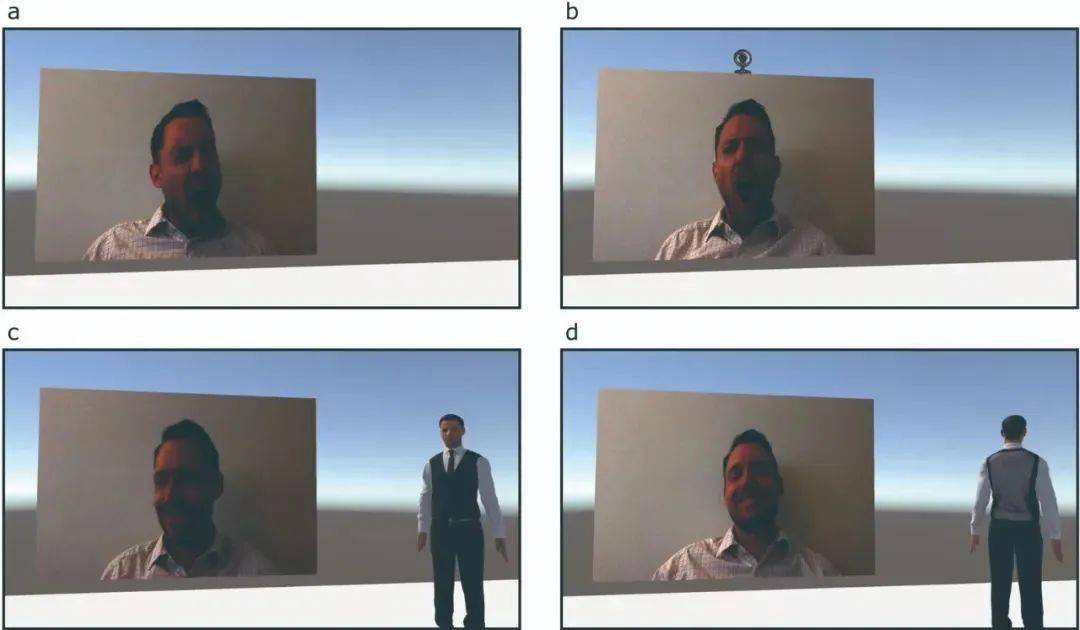 Technology peripherals
Technology peripherals
 AI
AI
 Using VR technology in psychotherapy has significantly improved treatment effectiveness
Using VR technology in psychotherapy has significantly improved treatment effectiveness
Using VR technology in psychotherapy has significantly improved treatment effectiveness
Using VR technology in psychotherapy, the therapeutic effect has been significantly improved
Recently, psychologists are increasingly using virtual reality (VR) technology in psychological experiments. Psychologists can use VR technology to create any environment they need and control all visual and auditory factors, so this technology is very convenient.
The development of VR technology makes it difficult for people to distinguish between virtual scenes and the real world. The brain is tricked into thinking that it is in the virtual environment being viewed. Even though you consciously know that this is VR and not a real space, your brain incorporates senses such as sight and hearing into the virtual reality construct as if they were real.
What is the difference between people’s reactions in a real environment and a VR environment?

VR test yawn
Researchers conducted an interesting experiment - using VR to test yawning.
When we see others yawning, about half of us will also be infected and yawn accordingly. This is a contagious physiological phenomenon. But if someone suddenly appears at this time, such as your leader, then you may stop yawning because you will feel a bit embarrassed to yawn in front of your leader.
Researchers placed subjects in a VR environment. When the subjects saw a "person" yawning in the VR environment, about half of the subjects were also infected. When the "leader" in the VR environment suddenly appeared, the subjects did not stop yawning. In other words, stimuli that trigger contagious yawning in real life have the same effect in VR environments, but stimuli that suppress yawning in real life have no effect in VR environments. Why is this?
Conscious and subconscious
Researchers have discovered that the human brain uses multiple senses simultaneously to construct our perception of reality. Different senses interact and compare with each other to create a seamless sense of reality. When we enter the park, we can not only admire the gorgeous flowers, but also hear the sweet chirping of birds and smell the fragrant fragrance of flowers. Our three senses of sight, hearing and smell work together to create this complete sense of reality. What can be concluded from the VR experience is that building a sense of reality does not have to rely on the participation of all the senses. For example, pure visual presentation is enough to let us feel the beauty of a complete park. Sound was added just to make the realism of the park's beauty more convincing.
Therefore, the contagious nature of yawning can be triggered by visual and auditory stimulation, which is a subconscious behavior. However, when yawning has already begun, our awareness kicks in. Just like we may be suddenly frightened by something happening in the outside world, but we can quickly control our nervousness. People are subconsciously inclined to yawn when they see a leader walking in, even though they feel they are losing their composure by doing so and therefore consciously suppress the behavior. In a virtual environment, because you know that the person coming is virtual, there is no need to control yourself. The behavior of suppressing yawning is not just an unconscious automatic reaction, but can also be controlled through conscious beliefs.

VR technology used in psychotherapy
There is a contrast between what the conscious brain knows and what the subconscious brain feels, like you can overcome fear, but you cannot suppress the tension caused by fear. The results of this study provide researchers with more clues: virtual reality technology has already achieved results in audio-visual aspects, and will focus on the development of tactile experience in the future. This not only makes the experience feel more real, but also helps researchers understand the process by which various sensory modules in the brain interact and compare with each other when people perceive reality.
Currently VR technology is gradually being used to treat psychological and mental illnesses, such as fear of heights, anorexia, social disorders, schizophrenia, etc.
In the treatment of acrophobia, VR technology is mainly used to create virtual situations that make patients afraid of heights, such as looking down from high, taking a transparent sightseeing elevator, etc., in order to eliminate the patient's nervousness; In the treatment of anorexia, patients are allowed to watch virtual characters in a VR environment easily complete some tasks that require high body shape, such as crossing some obstacles, etc., in order to increase the patient's enthusiasm to change their body shape; in the treatment of social disorders , VR technology is used to establish virtual social scenes, allowing patients to participate in social activities with virtual characters in the scene, so as to eliminate patients' social fear; in the treatment of schizophrenia, VR technology is mainly used to simulate schizophrenia patients By presenting virtual hallucinations to patients with schizophrenia, they can understand the process of hallucinations and receive specialized treatment to overcome and eliminate various hallucinations. Clinical practice shows that using VR technology in psychotherapy can significantly improve treatment results.
VR technology has had a profound impact on people’s way of thinking, world view, space and time. In the future, VR technology will be increasingly used in the field of psychotherapy, greatly promoting and improving the level of psychotherapy and becoming a commonly used technology in psychotherapy.
The above is the detailed content of Using VR technology in psychotherapy has significantly improved treatment effectiveness. For more information, please follow other related articles on the PHP Chinese website!

Hot AI Tools

Undresser.AI Undress
AI-powered app for creating realistic nude photos

AI Clothes Remover
Online AI tool for removing clothes from photos.

Undress AI Tool
Undress images for free

Clothoff.io
AI clothes remover

Video Face Swap
Swap faces in any video effortlessly with our completely free AI face swap tool!

Hot Article

Hot Tools

Notepad++7.3.1
Easy-to-use and free code editor

SublimeText3 Chinese version
Chinese version, very easy to use

Zend Studio 13.0.1
Powerful PHP integrated development environment

Dreamweaver CS6
Visual web development tools

SublimeText3 Mac version
God-level code editing software (SublimeText3)

Hot Topics
 1386
1386
 52
52
 I Tried Vibe Coding with Cursor AI and It's Amazing!
Mar 20, 2025 pm 03:34 PM
I Tried Vibe Coding with Cursor AI and It's Amazing!
Mar 20, 2025 pm 03:34 PM
Vibe coding is reshaping the world of software development by letting us create applications using natural language instead of endless lines of code. Inspired by visionaries like Andrej Karpathy, this innovative approach lets dev
 Top 5 GenAI Launches of February 2025: GPT-4.5, Grok-3 & More!
Mar 22, 2025 am 10:58 AM
Top 5 GenAI Launches of February 2025: GPT-4.5, Grok-3 & More!
Mar 22, 2025 am 10:58 AM
February 2025 has been yet another game-changing month for generative AI, bringing us some of the most anticipated model upgrades and groundbreaking new features. From xAI’s Grok 3 and Anthropic’s Claude 3.7 Sonnet, to OpenAI’s G
 How to Use YOLO v12 for Object Detection?
Mar 22, 2025 am 11:07 AM
How to Use YOLO v12 for Object Detection?
Mar 22, 2025 am 11:07 AM
YOLO (You Only Look Once) has been a leading real-time object detection framework, with each iteration improving upon the previous versions. The latest version YOLO v12 introduces advancements that significantly enhance accuracy
 Best AI Art Generators (Free & Paid) for Creative Projects
Apr 02, 2025 pm 06:10 PM
Best AI Art Generators (Free & Paid) for Creative Projects
Apr 02, 2025 pm 06:10 PM
The article reviews top AI art generators, discussing their features, suitability for creative projects, and value. It highlights Midjourney as the best value for professionals and recommends DALL-E 2 for high-quality, customizable art.
 Is ChatGPT 4 O available?
Mar 28, 2025 pm 05:29 PM
Is ChatGPT 4 O available?
Mar 28, 2025 pm 05:29 PM
ChatGPT 4 is currently available and widely used, demonstrating significant improvements in understanding context and generating coherent responses compared to its predecessors like ChatGPT 3.5. Future developments may include more personalized interactions and real-time data processing capabilities, further enhancing its potential for various applications.
 Best AI Chatbots Compared (ChatGPT, Gemini, Claude & More)
Apr 02, 2025 pm 06:09 PM
Best AI Chatbots Compared (ChatGPT, Gemini, Claude & More)
Apr 02, 2025 pm 06:09 PM
The article compares top AI chatbots like ChatGPT, Gemini, and Claude, focusing on their unique features, customization options, and performance in natural language processing and reliability.
 How to Use Mistral OCR for Your Next RAG Model
Mar 21, 2025 am 11:11 AM
How to Use Mistral OCR for Your Next RAG Model
Mar 21, 2025 am 11:11 AM
Mistral OCR: Revolutionizing Retrieval-Augmented Generation with Multimodal Document Understanding Retrieval-Augmented Generation (RAG) systems have significantly advanced AI capabilities, enabling access to vast data stores for more informed respons
 Top AI Writing Assistants to Boost Your Content Creation
Apr 02, 2025 pm 06:11 PM
Top AI Writing Assistants to Boost Your Content Creation
Apr 02, 2025 pm 06:11 PM
The article discusses top AI writing assistants like Grammarly, Jasper, Copy.ai, Writesonic, and Rytr, focusing on their unique features for content creation. It argues that Jasper excels in SEO optimization, while AI tools help maintain tone consist



